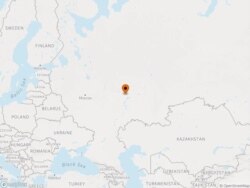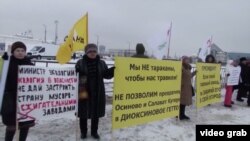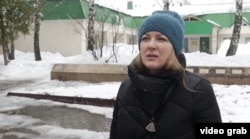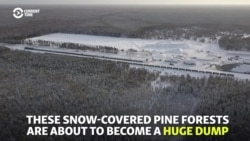Regina Kalimullina is not convinced the solid-waste incinerator planned for her town in Russia’s southern republic of Tatarstan will be as clean as officials claim it will be.
Like others in Osinovo, a town of some 10,000 about 25 kilometers from the regional capital of Kazan, Kalimullina fears the facility will foul the air, spewing carcinogenic particles in the air and raising the threat of cancer.
“The Health Ministry of Tatarstan now says that every 35th resident has cancer. Here, it’ll be every third [resident]. It’s horrible,” Kalimullina told Current Time, the Russian-language network led by RFE/RL in cooperation with VOA.
The project in Osinovo is part of the nationwide Clean Country initiative launched in 2016. The plan aims to build five solid-waste incinerator plants in Russia by 2025: four in the Moscow region and one in Osinovo. Despite vocal opposition by residents and others to the plant in Osinovo, the local council voted unanimously last summer to hand over land to a private Russian company contracted to build the incinerator.
Russia has a mounting waste problem as landfill space shrinks. Unlike elsewhere in Europe, Russian recycles only a fraction of the waste it produces. Activists say recycling trash is the answer, not burning or burying it.
In Osinovo, where pickets and other protests continue, authorities say residents have nothing to fear from the planned incinerator, noting such facilities can be found smack in the middle of cities in Western Europe.
However, Elena Izotova, a Russian meteorologist versed in the workings of Russian incinerators, says there’s a big difference between technology used in such plants in Europe and those in Russia. She says European facilities are equipped with much more effective scrubbers to make sure dioxins and other pollutants don’t escape into the air.
Russian plants aren’t so lucky, relying on more basic coal-based filtration, according to Izotova.
“What type of coal will stop dioxins? These are nanoparticles,” explained Izotova, noting that after burning the trash, a highly toxic brew of ash and slag remains.
“And this waste will need to be stored somewhere. And they tell us it’s a nonpolluting process. They’re trying to fool the people,” she said.
In mid-2018, public hearings about the planned incinerator were held in Osinovo, although residents say they weren’t given a chance to speak.

“The deputies here are mostly state employees or businessmen, and pressure was put on them,” said Valentina Kuznetsova, who’s lived for years in the town. “The thing is, before the vote, we asked [the deputies], and nine out of 12 said they were categorically against it. But in the end...” she said, her voice trailing off.
The vote by local deputies to approve the tract of open land for industrial purposes -- like the incinerator -- was unanimous. The land where the incinerator is due to be built is now owned by a subsidiary of the Rostec corporation, RT-Invest. The cost of the project is estimated at 28 billion rubles ($428 million).
Rostec is a state-owned holding company for Russia’s defense industry and has been sanctioned by Washington for its role in eastern Ukraine, where Russia is supporting separatists in a conflict that has left some 13,000 dead since April 2014.
Activists have also questioned whether there is even a need for the plant.
“Trash incinerator plants are generally not needed in Russia. We need to outlaw their construction,” said local ecological activist Andrei Kitov. “What’s the alternative? Recycling.”
Kitov and other activists reject claims voiced by some government officials that there is little or no demand for recycled material and that it is cheaper and more profitable to burn trash.
The planned incinerator in Osinovo, projected to go into operation in 2022, will have a capacity to incinerate 555,000 tons of trash a year. That’s about half of all the solid waste generated in Kazan in a year.
WATCH: Russian Mega-Dump Prompts Angry Protests
Osinovo is not the only Russian town alarmed by government plans to handle trash. 2018 witnessed a wave of protests across Russia over government plans to handle solid waste.
Russians were shocked when dozens of children in the Moscow regional town of Volokolamsk were hospitalized in March 2018 with suspected poisoning from gases leaking from a local landfill. Several thousand people turned out for a demonstration there in April 2018.
Nationally, Russia recycles just 4 percent of its waste. Moscow, with less than 10 percent of Russia's population, generates about 20 percent of its solid waste, according to government statistics.
About 90 percent of Moscow’s waste is sent to landfills in the surrounding region. Many of those landfills have exceeded their planned capacity but continue to receive shipments from the capital.
Government plans to ship large quantities of Moscow's garbage by train to a vast new landfill in Arkhangelsk Oblast have been met with anger from locals there.
In January of this year, Russian President Vladimir Putin ordered the government to develop a national system of waste disposal and a national oversight agency called the Russian Ecological Operator before the end of 2019. Activists say the government's planning is opaque and the concerns of local residents are systematically ignored.
On February 3, thousands of protesters in about 30 Russian regions took to the streets in a national demonstration under the slogan "Russia is not a dump."








